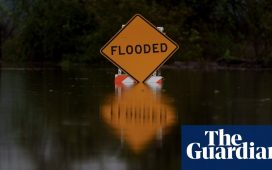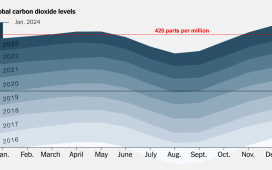During the lead-up to Christmas, temperatures in the US remained subfreezing for several days, leading to some deep snow accumulations. Although many people had a white Christmas, loved ones were kept apart due to road closures and cancelled flights as people were advised to stay at home.
Power outages affected multiple states, leaving many without electricity or heating and making contact with friends and family even more difficult over the festive period.
Thankfully, this cold spell is coming to an end, as temperatures are expected to rise to about 5C above average across much of the central US by midweek. This fast change in conditions is linked to a combination of a northerly shift in the jet stream, a change in the position of the low-pressure system that was sitting across eastern Canada over the past week or so, and south-westerly surface winds bringing warmer air poleward from the Gulf of Mexico.
However, the speed of the change in temperatures may lead to some localised flooding, as snow accumulations begin to melt, creating further hazards and obstacles for locals and the emergency services to end the year.
Parts of Europe are also forecast to experience some warmer-than-average conditions over the new year period. Like the US, there will be a northwards shift in the jet stream, which, accompanied by a large area of high pressure over the Mediterranean, will allow warmer, tropical air to take hold over most of the continent.
By the last few days of 2022, temperatures are widely expected to be around 5C above the seasonal norm, apart from northern Scotland, and parts of southern Norway and Sweden, which may be slightly chillier than the climatological average. Parts of France, Germany, Poland and the Czech Republic are expected to have the greatest temperature anomalies, in excess of 10C above average, which in real terms would mean temperatures reaching the mid to high teens. This will come as a big contrast to the Arctic conditions of only a week or so ago.


